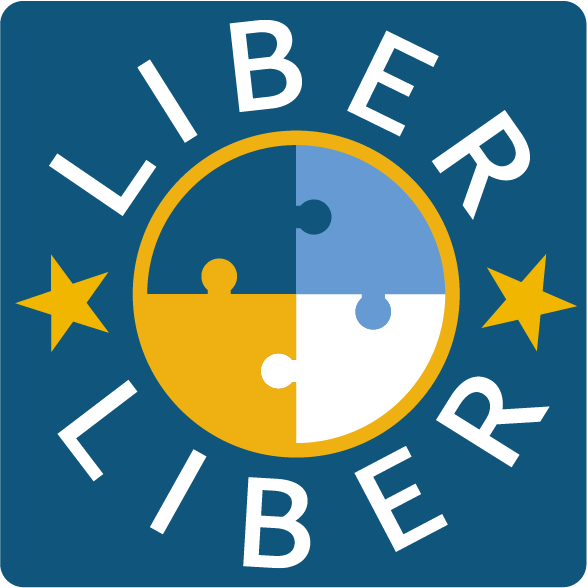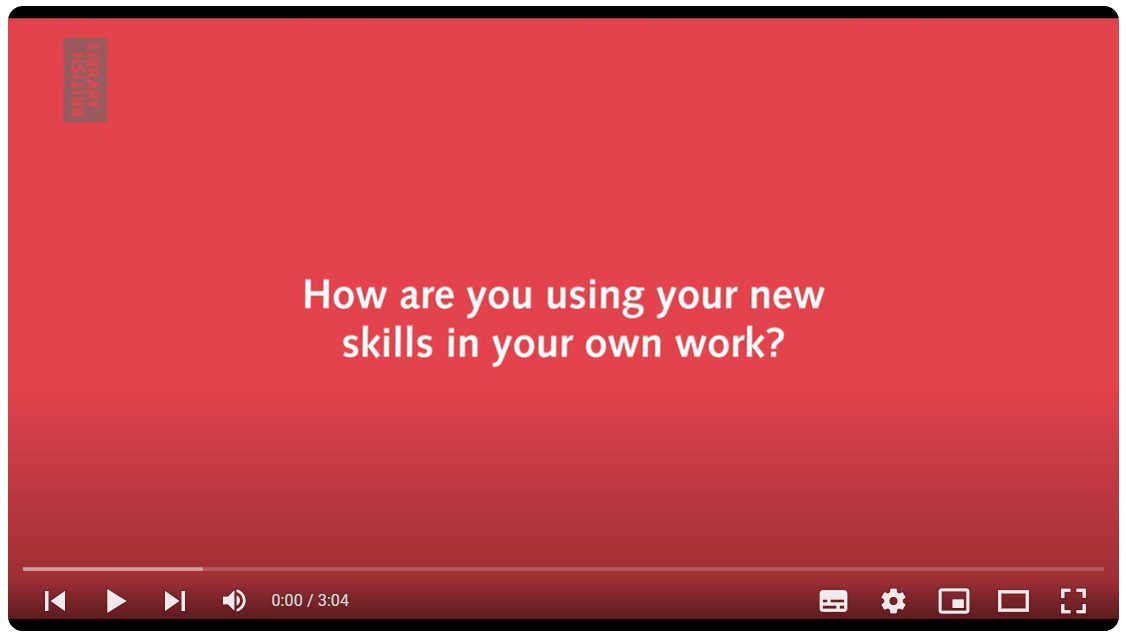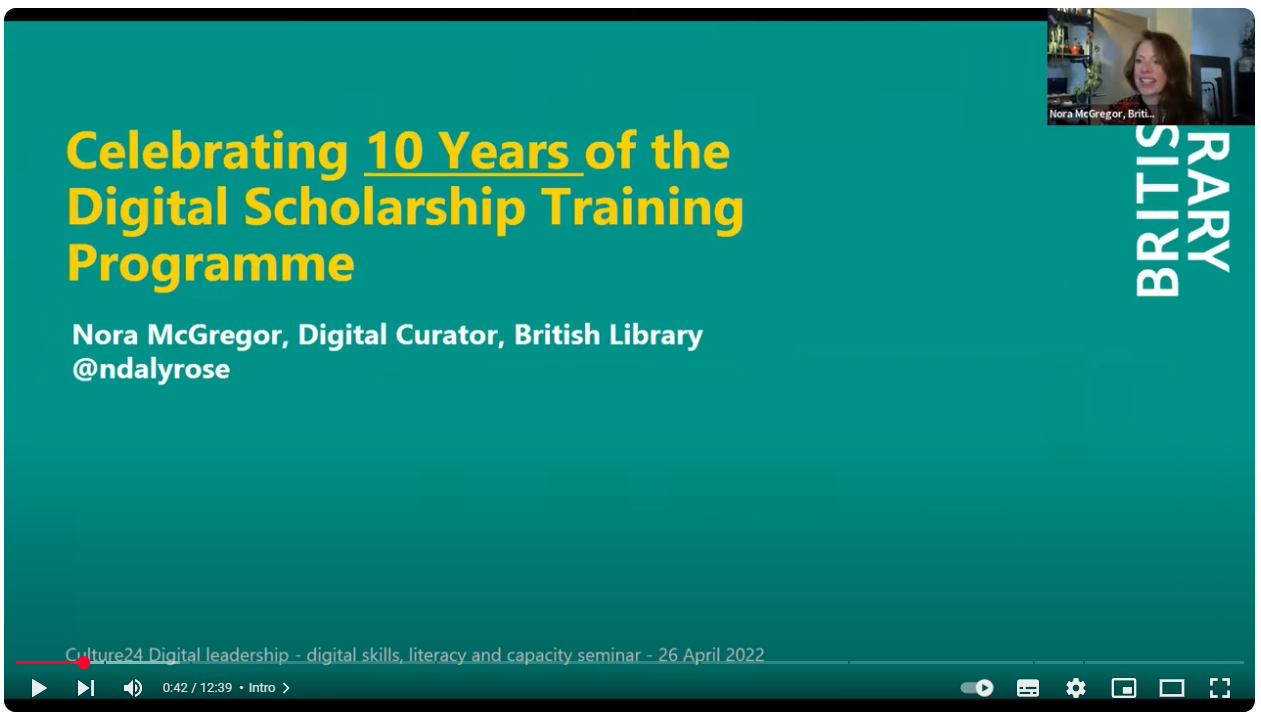Start your own local DS Training Programme
A LIBER Digital Scholarship & Data Science Topic Guide for Library Professionals
Introduction
The Digital Research Team has been providing training to British Library staff for over a decade through our bespoke Digital Scholarship Training Programme.
This DS Topic Guide shares a few things we’ve learned along the way about establishing an internal community of practice and training programme. It includes practical pointers for using the materials presented here to start a localised and sustainable digital scholarship and data science training programme at your own institution!
Relevance to the Library Sector (Case Studies/Use Cases)
To understand the importance of supporting the development of digital skills in our sector, one only needs to look at Digital Scholarship & Data Science Topic Guides for Library Professionals, which contains a plethora of useful real-life applications of new technologies being put into action in libraries. The DS Topic Guide: Getting Started in DS also provides extensive evidence such as a number of Digital Scholarship & Data Science Skills Competency Frameworks for library staff which underscore the urgent need for upskilling.
But what are the benefits in particular of establishing a local training programme or building a community of practice for staff in your institution? By far the most compelling argument we’ve found is that by creating a welcoming space, and some structure, where colleagues can regularly come together, explore new ideas and share knowledge, a culture of continuous learning has thrived. This makes keeping up with the latest developments in digital scholarship and data science applications much easier.
Hands-on activity/self-guided tutorial(s)
If you’ve been thinking about getting your own local training programme up and running, whether a small casual interest group or a full-blown digital transformation initiative, the following practical steps can be used to help you on your way!
Find your people
Get a small group of willing colleagues at your institution together and set up a way for them to communicate regularly, preferably asynchronously/remotely. We use a corporate wide MS Teams channel for this at British Library but you could also set up things like a slack channel or even a whatsapp channel depending on where people at your institution tend to gravitate. Focus on your purpose of bringing people together, think about the messaging and keep it light, “Learn new stuff together that can help make your job easier” usually suffices! Try not to be too targeted - cast the net wide as people of all interests/academic disciplines/job profiles, abilities and backgrounds will undoubtedly have something to contribute: digital scholarship and data science is a collaborative affair and your group will be all the better for its diversity.
Sharing invitations to your events as widely as possible has another side-effect - people who aren’t able to attend our sessions report that they learn a lot just by seeing what kinds of topics we’re covering!
Get Buy-in (if you need to!)
In some cases you may need buy-in from managers to allow staff time and space to dedicate to learning these new skills. It can be difficult to convince managers sometimes of the value of learning skills now which may take some years to truly embed or come to practical fruition. Spending time building ones “awareness” of the landscape is not always deemed a strong enough basis for approving time away from more immediate tangible deliverables, but awareness is the first step on the learning ladder and is essential for transformation. This resource, Digital Scholarship & Data Science Topic Guides for Library Professionals, contains loads of evidence to share with your management for why investing in digital scholarship and data science staff skills and awareness is key to sustainable digital transformation over time. Have a look at the Getting Started in DS Topic Guide, particularly the section on Relevance to the Library Sector for the latest supporting reports and competency & skills frameworks on this.
When we set up our training programme we laid out some specific objectives to make clear to ourselves and colleagues what we ultimately hoped to achieve with it:
- Staff are familiar and conversant with the foundational concepts, methods and tools of digital scholarship.
- Staff are empowered to innovate.
- Collaborative digital initiatives flourish across subject areas within the Library as well as externally.
- Our internal capacity for training and skill-sharing in digital scholarship are a shared responsibility across the Library.
Nothing compares to individual staff digital transformation stories though, and at the British Library we’ve started to capture these which help to demonstrate the tangible value such training has for individuals and institutions.
“The Digital Scholarship Training Programme has introduced me to new software, opened my eyes to digital opportunities, provided inspiration for me to improve, and helped me attain new skills” -Graham Jevon, British Library
Read more about Graham Jevon’s digital transformation journey on the British Library Digital Scholarship blog or have a look at this series of videos we created to mark the 10th Anniversary of the British Library Digital Scholarship Training Programme in 2022. It highlights specific transformative experiences for staff who took time out to engage in our Digital Scholarship Training Programme over the years.
Try running a monthly “Hack & Yack”
Establishing what we call a regular Hack & Yack style meeting is a really nice way to learn something new with other colleagues and removing the planning and expectations around a formal training offering. At the British Library our Hack & Yack’s are once a month for two hours on a set day and time. It is a casual, hands-on session where colleagues from across all departments of the institution come together to understand a current topic or digital method by working through an online tutorial or demonstration at everyone’s own pace but with support of each other.
We use our Hack & Yack’s as an opportunity to explore new tools/techniques/applications relevant to digital research and keep our own skills up to speed. It is not a formal training session. Attendees are reminded that we’re all learning together and that everyone will be coming to the tutorials with different experience/knowledge/skills.
Each Hack & Yack usually starts with one person, which may or may not be the organiser, giving a high-level view of the topic of the day, and then sharing one or more tutorials that the group can try out, either stepping through one online activity together as a group or providing time for everyone to explore individually at their own pace and chat about how it’s going as they work through the steps. These sessions aren’t recorded so that attendees can be open and frank about their experience!
Within each of the DS Topic Guides is a Hands-on activity and other self-guided tutorial(s) section that would make a perfect start for your first Hack & Yacks or take a look at the many platforms hosting training materials referenced in Getting Started in DS!
Start a discussion/reading group
Whether you call it a ‘reading group’, a discussion group, a lunchtime series - the point is to provide regular opportunities for people to get together, and learn and support each other through discussion. You might set an article, blog post or chapter, a video or podcast.
Things we’ve found useful:
Begin each session with quick introductions - name and department, or name and another useful piece of information. Why? Hopefully you’ll have a range of folk and they mightn’t all have met before. It means that everyone has spoken at least once right from the start, which is important for encouraging contributions.
Make it ok for people not to have finished reading, watching or listening to the thing you’re discussing. You could do a show of hands to see who’s finished it or not finished it. Why? There’s something about ‘confessing’ that lets people ask questions without worrying that it was covered somewhere towards the end. It can also be useful to understand why people didn’t finish (unless they just ran out of time, which is highly relatable) - did the piece get complex, jargony, boring?
If you have a range of personality types at your events, you can set some ground rules to encourage more equitable participation. For example, you could ask people to ‘raise their (onscreen) hands’ when they want to contribute, and come to people in the order that their hands were raised. You can also ask people who haven’t spoken much for their thoughts - some people appreciate a prompt.
Each DS Topic Guide has a Recommended Reading/Viewing section that might give you some good ideas on reading materials.
Put together a regular talk series
Did you go to a conference and were inspired by something you heard? Did someone on social media say something interesting about the intersection of cultural heritage and data? Is someone coming by your Library for a meeting and they’re working in digital scholarship and data science? Don’t be shy! Reach out and ask them if they’d be willing to share their knowledge with your group. At the British Library we call our talk series “21st Century Curatorship talks” and it’s been a wonderful opportunity to learn from the best in the sector, while also growing interest in the wider training programme. When colleagues feel they only have an hour to spare, or are not yet ready for the hands-on of a hack & yack, offering talks are a great way to lower the barrier of entry to complex topics. We often use these talks to gauge interest in a topic and then plan our reading group and hack & yack topics around deepening knowledge of the topic. We’ve found that staff members remember and share the stories they hear at these talks, increasing their impact and reaching people who don’t attend.
Create an identity
After your group of the willing has been running for awhile it’s useful to create an identity for yourselves. Perhaps you consider yourselves a network, or an interest group or maybe you’d like to start formalising your gatherings under a “training programme” moniker. Whatever you decide, it helps to bring in new folks when there is an established identity and even maybe a logo in advertisements.
Recommended Reading/Viewing
In this short video from a Culture24 Digital Leaders - digital skills, literacy and capacity online seminar, I talk about inspiring and supporting team members from The British Library to pursue digital skills and literacy development through their Digital Scholarship Staff Training Programme.
The British Library Digital Research Team regularly share information about the training programme including topics covered over on our Digital Scholarship Blog:
Finding Communities of Practice
The Digital Research Team of the British Library are more than happy to be contacted at digitalresearch@bl.uk for a chat about their experiences in starting up a local DS training programme.


